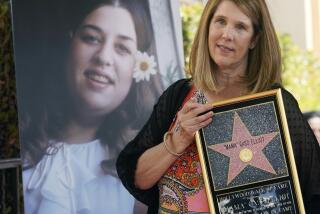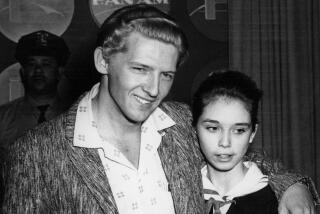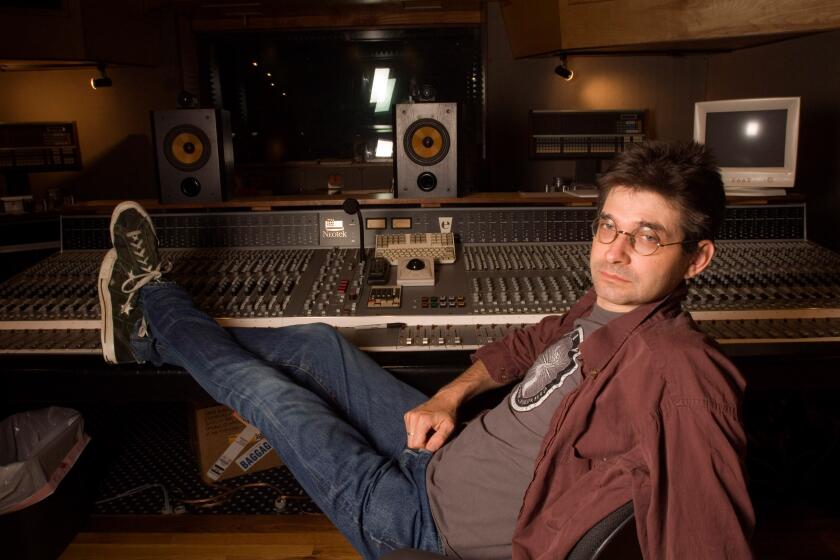QUEEN OF SOLITUDE
In the ivory towers that house record industry marketing executives, a fair amount of head-scratching and puzzled speculation is going on over a phenomenon whose early tremors went distressingly undetected by the calculators and sales charts and demographic sheets. A one-woman phenomenon.
Suzanne Vega is the unlikeliest of 1987’s new stars, a 27-year-old New Yorker who is more likely to be described as “waifish” and “a folk singer” (somewhat misleadingly on both counts) than as a rock bombshell or post-disco diva. Her lyrics reach for poetry, not pornography; the songs were written on acoustic guitar, not built around a computerized drum track; and she hardly ever even writes songs about love, much less sex.
Yet Vega’s gone gold. Her second album, “Solitude Standing,” has come out of (almost) nowhere to sell over 500,000 copies in America in less than three months of release. But who’s buying?
The prevailing notion is that she’s that rare item: a true yuppie-made star, appealing almost exclusively to the lost musical audience of urban adults, a la the surprise post-30 buying frenzy that greeted Paul Simon’s “Graceland.” But she says she sees a more diverse throng of fans beyond the footlights or backstage at her shows:
” . . . Teen-age boys who look very sincere and earnest with their notebooks and their Camus and their Sartre. . . . And then you have the people in their 30s and 40s who felt comfortable with a softer kind of music, or who liked Joni Mitchell and James Taylor. . . . Then you have Joe Skinheads in black leather jackets who think the lyrics are really cool. . . . It seems like anybody who feels isolated. They come to my concerts and they can be isolated together.”
Perhaps the common thread is the cross-demographic contingent out there that feels alone again, naturally, in the crowd.
“Solitude Standing” is, as its title suggests, an album about silently watching, learning, reevaluating and adjusting--all by one’s self. But it’s not (speaking of Paul Simon) “I Am a Rock.” The characters on the album aren’t aching, lonely souls in anguished angst; if anything, they like being by themselves, thank you.
“Working on this album, I was thinking on solitude more as a position of strength than of weakness,” said Vega, whose low, quiet speaking voice belies an articulate, quick-witted, even cocky attitude that is anything but waifish.
“Therefore these characters would feel that their solitude is a benefit, as opposed to a condition they have to get rid of, something that has to be amended. It’s not like they’re going to any singles bars and trying desperately to pick up women so that they’re not going to be alone.
“There’s something very appealing to me about solitude. And I think I’ve gotten less lonely as I’ve gotten older, too. When I was a kid I remember feeling very lonely a lot of times. But lately I find that I’m not alone very often, so when I am, I really enjoy it.”
The Vega stamp: soft but sharp. She doesn’t agree with those who hear her music as coolly detached or dispassionate, and “mellow” isn’t exactly in her ballpark either. “I never wanted it to be pastoral or easy-listening music at all,” she explained during a recent visit to Los Angeles, where she’ll return for shows Saturday and next Sunday at the Wiltern Theatre (she’s also at San Diego’s North Park Theatre on Friday). “I never wanted it to fade quietly into the background. I always heard it having an edge.”
Still, until recently most of Vega’s material originated with her career as a genuine minor-league folkie playing solo sets in Greenwich Village coffeehouses, where the edgiest notes tended to be the occasional discord on acoustic guitar.
Rock ‘n’ roll was all but an unknown quantity to an admittedly insecure young woman--born in Santa Monica, raised in New York, educated at the High School of Performing Arts and Barnard College--who was more interested in exploring dance at school and acoustic music at home than venturing out to the dark byways of the club scene. “I missed the whole punk movement in New York because I baby-sat on Saturday nights,” she noted.
Her pre-rock world view was a far more romanticized one--which is one reason why she dated the songs on her new album’s lyric sheet, to show the progression from the more sentimental compositions of the baby-sitting days to the objective observations and stark realism of her writing today.
“I think that ‘Gypsy’ and ‘Calypso’ are slightly different stylistically than the rest of the album,” she said of two songs written in 1978, when Vega was all of 18. “For me it was a marked difference between, say, before 1979 and after 1979. I guess 1979 is when I went to my first rock ‘n’ roll concert. I went to see Lou Reed, and after that I started listening to rock ‘n’ roll, which I had never done. Suddenly I realized I didn’t want to write about certain things anymore.”
About her pre-rock “folkie” days, she said, “My life growing up was very difficult. That’s probably why I turned to folk music to begin with, because of the amount of aggression and violence and so forth that happens in New York and was happening in my life. I think I was sort of looking at folk music as a way of going back to a simpler time. I listened to Woody Guthrie songs where concepts like justice were clearly defined and it seemed like the individual could win--all that stuff. This, for me, was very interesting and very novel.
“But I guess after I saw Lou Reed, suddenly it hit me that I could write about things I had experienced without softening up the edges or apologizing for it or putting it in a nice package necessarily.”
The ironic thing, she said, is that compared to most rock ‘n’ roll now, her music does seem very soft and does sound very sweet in a way, leaving her something of a gentle alternative to the mainstream now. But she hadn’t perceived herself that way at all.
“I had perceived it as taking the folk tradition and making it contemporary, and toughening it up and hardening the language, learning how to use words differently,” she explained.
So, she didn’t exactly welcome the suggestions that her first album was a throwback. “The people who said, ‘Oh, isn’t this nice? We’re having a singer/songwriter revival!’ Or ‘We’re going back to the good old days of the ‘60s!’ Which is not what I had in mind. With the second album I realized I had to be a little more . . . confident .”
But this album didn’t come easy. Vega had trouble writing the lyrics for the record, holding up its projected release by close to a year, to the frustration of producers and record company executives alike. The song “Language” expresses surprising sentiments for someone to whom words would seem to come so easy: Words are too solid / They don’t move fast enough / To catch the blur in the brain/That flies by and is gone . . . .
“I remember as a kid being very, very inarticulate,” she recalled. “I remember my father going ‘How do you feel about this?’ and I would sit there for 15 minutes trying to find a way to begin saying what I felt about it, and by that time no one’s interested anymore! In the meantime I would be sitting there struggling, and I’d think about it for years afterward. You could spend a lifetime trying to figure out how you felt when you were 7.”
So now that Vega the observer is suddenly Vega the observed, how does it feel?
“I’m getting used to it. It used to embarrass the hell out of me. It took me a while to realize that this is what I do now, so therefore when someone takes my picture, if I’m gonna insist on being embarrassed, there’ll be a lot of pictures of me looking embarrassed and sheepish. So I’m becoming a little more comfortable with it. Also, I feel people are sincere in their appreciation, and I don’t think I’ve sold out or done anything that I wouldn’t have done ordinarily.
“I don’t feel like I’ve played the game, as in become more sexy deliberately so people will buy my record. If anything, I run the other way. Most people saw the first album cover and then when they would meet me in person would say, ‘You don’t look like your album cover! You look sort of pretty!’ I’m going, ‘Thanks a lot. Great.’ It occurred to me that maybe I was diminishing myself, taking my true personality and diminishing it for the stage and for the records, making myself plainer and more awkward than I really was.”
More to Read
The biggest entertainment stories
Get our big stories about Hollywood, film, television, music, arts, culture and more right in your inbox as soon as they publish.
You may occasionally receive promotional content from the Los Angeles Times.






